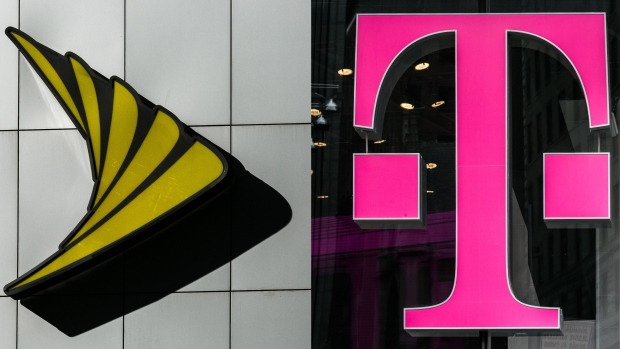Feb 10, 2020
T-Mobile is said to win approval to complete Sprint takeover
, Bloomberg News

T-Mobile US Inc. is poised to win court approval for its US$26.5 billion takeover of Sprint Corp., according to a person with knowledge of the matter, advancing a deal that will reshape the wireless industry.
U.S. District Court Judge Victor Marrero is expected to rule as soon as Tuesday, said the person, who asked not to be identified discussing the case. States led by New York and California failed to show the combination of the third- and fourth-largest U.S. wireless carriers would harm consumers by raising prices.
The judge’s office informed both sides of the decision earlier Monday, said the person.
The decision is a huge win for T-Mobile and its owner Deutsche Telekom AG, as well as SoftBank Group Corp., Sprint’s parent. The combined company, which will operate under the T-Mobile name, will have a regular monthly subscriber base of about 80 million, putting it in the same league as AT&T Inc., which has 75 million subscribers, and Verizon Communications Inc., which has 114 million.
The deal is also a victory for Dish co-founder and Chairman Charlie Ergen. With his company’s core satellite television business in decline, Ergen has set a goal of building a 5G future for Dish by acquiring assets from the two carriers.
After the merger, T-Mobile will also have more spectrum -- the range of frequencies through which wireless signals are transmitted -- than any other carrier. The larger capacity of its network will give the combined company an advantage as the industry transitions to the next generation of wireless technology, the much-faster 5G standard.
The court victory comes almost two years after the deal was first announced. The states’ lawsuit was the last major hurdle to the deal after it secured the blessing of regulators at the Federal Communications Commission and Justice Department’s antitrust division. It still needs approvals from California’s utility board and a federal judge in Washington who must sign off on the Justice Department settlement.
Concessions
To win federal approval, T-Mobile and Sprint had agreed to sell multiple assets to satellite television provider Dish Network Corp. in order to create a new fourth competitor. The new Dish wireless network will start life with about 9 million subscribers.
T-Mobile and Sprint had been the most aggressive U.S. wireless companies in terms of price competition in recent years, forcing AT&T and Verizon to follow moves like ending service contracts and adopting unlimited data plans. The proposed combination came under fire from lawmakers and consumer advocates who said it would lead to higher prices and fewer services, especially for poor and rural consumers.
The companies had pursued a combination for several years but the proposed deal was twice rejected as anti-competitive under the previous administration. After appointees of President Donald Trump approved the deal, the all-Democratic group of attorneys general from 13 states and the District of Columbia, filed their suit.
“This is exactly the sort of consumer-harming, job-killing mega-merger our antitrust laws were designed to prevent,” New York Attorney General Letitia James said at the time.
Tackling Concerns
T-Mobile Chief Executive Officer John Legere tried to address these concerns by promising to not raise prices for three years. Legere the shaggy-haired self-styled industry rebel helped remake T-Mobile into an industry maverick, and pitched the Sprint takeover as a way to better compete against industry leaders Verizon and AT&T. Legere, who announced in November that he will be handing off the job to Chief Operating Officer Mike Sievert in May, plans to remain on the combined company’s board.
One of their central pitches was that the deal would advance the introduction of 5G. The companies pledged to FCC Chairman Ajit Pai in May that they would deploy a 5G network covering 97% of the U.S. population within three years and 99% within six.



